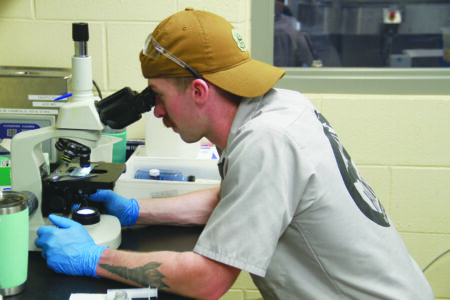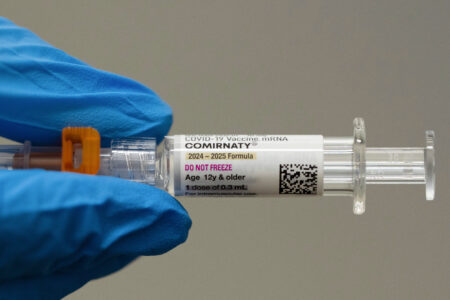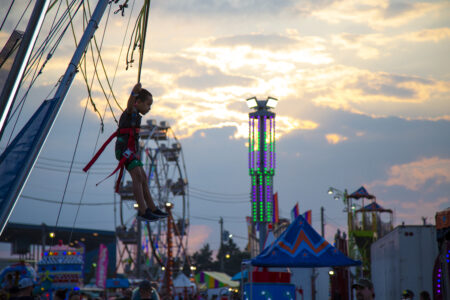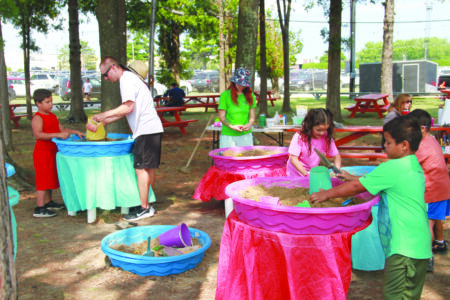Business Profile: Upper Hand Brewery part of community
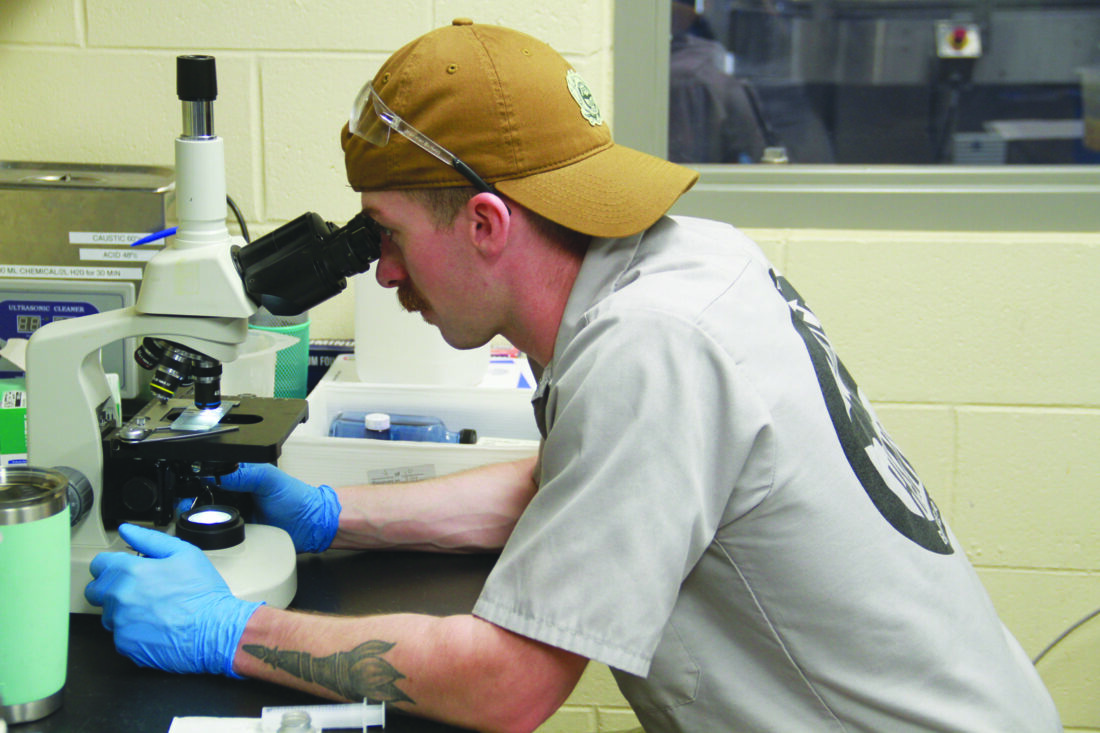
R. R. Branstrom | Daily Press A yeast viability test is underway at Upper Hand Brewery as brewer Hunter Prince peers through a microscope at a sample drawn from yeast that had settled after being used to make a batch of Upper Peninsula Ale. The still-living yeast will see another generation and go into a batch of 906 Ale.
ESCANABA — The brewery that was founded by Larry Bell as a division of the Comstock beer producer that bears his name is no longer in the same hands but remains small and under the control of brewers in Escanaba. Upper Hand serves patrons in its taproom near the Delta County Airport and distributes only to entities within Michigan.
Bell’s Brewery, officially founded in 1985, had become an established and popular brand — best known for flagships Oberon (a wheat ale) and Two-Hearted (an India pale ale) — when Bell began tinkering with the idea of launching a subdivision. The brainchild emerged in the early 2010s: the new brewery would be based in the Upper Peninsula, where Bell had a camp, and would be named Upper Hand — a fun reference to both Michiganders’ habit of using anatomy as maps and the expression that means “advantage.”
In creating a U.P. division, Bell was pursuing the adventure of starting a small-scale craft operation from the ground up again, but wanted to build it into one of the biggest production facilities in the U.P., said current Upper Hand General Manager Dakota Soule.
In 2013, Bell worked with the City of Escanaba to find a property for Upper Hand Brewery. They came very close to building in a piece of land in the Whitetail Industrial Park on 19th Avenue North, but ultimately settled on 3525 Airport Rd.
The city and many residents were pleased to see the brewery come to Escanaba. With open arms, city council even lowered the sale price when the 19th Ave. property was under discussion: “It demonstrates Escanaba’s willingness to work with manufacturers to locate here,” said then-City Manager Jim O’Toole.
“This is a step in the right direction for the area — and many more similar steps are needed,” wrote the Daily Press approvingly in an editorial on April 30, 2013.
Even though only five jobs were expected to be created at Upper Hand itself, the community was excited for economic stimulation — and the prospect of local-born beer.
After breaking ground in October 2013, Gundlach Champion and some subcontractors built the entire facility fairly quickly, even after a bad winter. The brewery, staffed by some experienced brewers, was ready to rock in less than a year.
By fall of 2014, Upper Hand was filling kegs and in November held an invite-only open house.
“When it was originally constructed in 2014, we were strictly production-focused and distribution-focused. In 2014 we didn’t have a taproom at all,” Soule explained. “It was making beer to push out to the entire Upper Peninsula, northern Wisconsin and northern Minnesota. That was our footprint.”
The first three beers made were the Upper Peninsula Ale (UPA), a pale ale that remains a favorite and is on tap at many local bars; Upper Peninsula Lager, which was discontinued for a while and just re-released this year; and Escanaba Black Beer, a dark ale that’s still popular but is now only made occasionally, as opposed to year-round.
The first Upper Hand beers to reach the public were pulled at Breezy Point Bar on Oct. 30, 2014.
While the first several runs were in kegs only, Upper Hand soon acquired a used bottle-filler from Abita Brewing of Louisiana and began selling its brews in glass bottles.
In 2015 and 2016, a large expansion took place, adding about 5,000 square feet to the brewery interior to accommodate 10 new fermentation vessels, excess cold storage capacity, warehouse capacity, glycol chillers and more. The expansion included not only the means for greater production but also more parking and space to allow visitors.
Equipment has been upgraded since the early days, and though some steps are handled by high-tech machines, brewers performs dozens of tests for each batch.
“It’s a beautiful hybrid of automated and human processes, which allows us to maintain that heart, that craft,” Soule said.
Though a sensory testing area was always part of Upper Hand so that the brewers could taste-test their creations at the end, the public wasn’t able to enter the building until a taproom opened in May of 2016. In began with a staff of one, Marley, for whose work Upper Hand remains grateful.
With the opening of the taproom — which was small — Upper Hand also opened a backyard area and hosted events and games outdoors. One such event was the “Double Ringer humdinger,” which celebrated the release of the seasonal double IPA named Double Ringer.
In March of 2018, Upper Hand ceased production of glass-bottled beer and switched to filling aluminum cans instead.
“We did that for a lot of reasons,” Soule said. “Cans are more efficient to package into. They’re better for beer quality because they don’t they don’t let in light or oxygen. …It’s more recyclable … and our customer base are the folks that are more recreational outdoors. It’s hunting, it’s camping, it’s boating, it’s fishing, it’s stuff that you really should be taking a can on those adventures, and not a glass bottle.”
Around the same time, the brewery changed their distribution model. Trying to sell to northern Wisconsin and northern Minnesota wasn’t very fruitful since the population is small, so Upper Hand changed course and decided to offer their products below the bridge. The beer can now be bought only in Michigan.
When Covid struck and hospitality services shut down, the taproom of course could no longer entertain guests. During that era, the merchandise line expanded and really took off. When the taproom was allowed to partially re-open, it did so as a party store — selling packs of beer to go.
In 2021, Larry Bell began seeking a buyer for Bell’s. The sale that took place passed both Bell’s and Upper Hand to New Belgium Brewing, a Colorado-based operation owned by Lion Little World Beverages, a subsidiary of Kirin Holdings Company Limited.
At the beginning of 2025, just Upper Hand sold again — arguably for the better.
New Belgium and Lion were happy to keep running Bell’s, but the small brewery in the U.P. didn’t really suit their model. The new owner, Seven Beverages of California, reportedly is giving the brewers in Escanaba free rein to run Upper Hand as an independent brewery and toy with their own recipes.
There were some changes, including reduction of staff and remodeling of some interior space. In March, an area that had housed administrative offices was converted into additional hospitality space. A new indoor stage has already hosted a comedy night, and the increased seating capacity will allow for more guests in the winter.
Other recent happenings at Upper Hand include new beverages — they’ve begun making hard seltzer and non-alcoholic hop water.
Also new this year this year is a countertop pizza oven that has enabled Upper Hand to serve pizzas, pretzel bites and soft pretzels with beer cheese. Soule said they hope to expand food offerings.
The taproom also sells (not-made-in-house) pop, bottled water, and other soft drinks. Complimentary coffee from Up North Roast is brewed every day.
Upper Hand Brewery is open to the public from 12 p.m. to 9 p.m. Thursday through Saturday and from 12 p.m. to 8 p.m. on Sunday, Tuesday and Wednesday.
One event coming up is “906 day on (Sept.) 5th,” meant to celebrate “America’s greatest area code.” Since the date 9/06 this year falls in line with another beer event in Marquette, Upper Hand decided to bump their tapping of 906 Ale to Friday.

